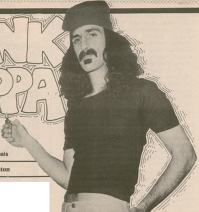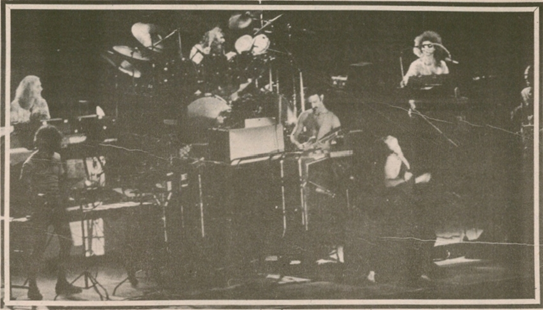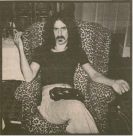Frank Zappa Interview
By Michael Branton
In the Fairmont Hotel in San Francisco, at one corner of its massive lobby, I have been directed by a desk clerk to the row of in-house telephones.
“Hello, I’m from COLLAGE. I have an appointment with Frank Zappa.”
A pause at the other end. “Oh, yes. That was for six o’clock, right? Well, just come on up.”
The voice is reassuring (am I slightly nervous?), pleasant sounding, and female. Hmmmm...
Up the elevator, a walk down a tomb-like hall, and I’m knocking on Room 262, the “Oxford Suite.” A large, bald man ushers me in without a word.
Another interview is winding up, so I endeavor to meet the hairless man (John Smothers, “Security”) and the female voice (Frank’s wife of eleven years who says, “Don’t call me Mrs. Zappa. Call me Gail. It always reminds me of his mother when people call me Mrs. Zappa!”).
Mainly, though, I stand staring at the bushy haired guy in the armchair. Orange pants rolled up over his ankles, snakeskin platforms, cat-eye sunglasses all the right touches, being captured on film by greedy photographers on a field day.
This, I tell myself, is Frank Zappa. How old was I when I scrounged up my first Mothers of Invention album, to the downfall of my formative young mind. Fourteen? Fifteen?
Zappa had displayed a characteristic lack of modesty when he composed the press release prior to his recent national tour, touting “a genuine, wholewheat, zircon-encrusted CONCERT SEASON, featuring ...THE BEST musical ensemble I have ever had the pleasure of unleashing on the jaded, disgusting world of POP MUSIC...”
Now, after playing 54 cities on a 57 city whirlwind tour (beginning in Phoenix, Arizona and collapsing, probably, in Los Angeles), Zappa is in the Bay Area to court the press.

“I started another movie, called ‘Baby Snakes,’ which we ought to have out by summertime ... You have these baby snakes, see, and you have the universe, and they relate to each other.”
Tomorrow, he and his six-man band would play the Maples Pavillion at Stanford University. But today has been set aside for relaxed conversation, much of which centers, naturally, around Zappa’s current projects.
This year he worked extensively on a recording package entitled Läther, a proposed four album box set complete with photographs and decorated dust jackets - the works. Läther (pronounced, he insists, Leather) is as yet unreleased, pending resolution of a legal hassle with Warner Brothers Records. But this tour was planned to push that product and that’s what Zappa means to do.
Priced, he thinks, around 20 dollars, Läther ranges in musical styles “...from small group recordings all the way to orchestra.”
The name, he says, “...fits in with the continuity of the album.” He lights a cigarette and smirks. “There’s a bunch of remarks about leather and bondage and stuff... For those of you who are interested in bondage, pain, and abuse, you should listen to the middle part of ‘Broken Hearts are For Assholes’.”
What do you have for those of us not really in tune with the painful pleasures?
“Well, let’s see. Side A is ‘The Adventure of Gregory Peck [Peccary].’ It’s a chamber orchestra with narration, and it’s a story of a little pig who invents the calendar, and the problems that arise once the calendar is invented.
“And, there’s also a ballet, a seven-minute ballet called ‘Pedro’s Dowry,’ which is straight...
“And, there’s an orchestral version of ‘Duke of Prunes’ with a feedback guitar solo. And ‘Revised Music For Guitar and Low-Budget Symphony Orchestra.’
“Läther was originally scheduled to be released as a four-record box simultaneously with one single disc, for those who couldn’t afford the box. But the single disc only has the rock and roll stuff. It doesn’t have the orchestra stuff.”
Although the recording is finished, down to the final mix, Läther is still only a gleam in Zappa’s eye. An eight year affiliation with Warner Brothers ended this year amid an intense court battle, shoving the fate of Läther into the hands of the law.
“I have a five million dollar breach of contract suit against Warners,” explains Zappa, “and they have threatened to sue Phonogram, who was going to be the distributor of my new label, Zappa Records. That’s the label that Läther is supposed to come out on.
“You gotta understand how this thing came about,” he says. “I had a contract with Warner Brothers Records, and it was supposed to expire on December 31st of this year. I had to deliver four units to them by December 31st. A unit is one completed album.
“So, I proceeded to deliver four completed albums to them in March of this year. And the contract specified that upon receipt of the tapes they had to pay me.
“It also specified that they had six weeks in the United States and six months outside of the United States to release these albums. They didn’t pay me, they didn’t release the albums, and they haven’t paid me the royalties on other albums that have already been released. Therefore, I claim breach of contract.”
According to Zappa, since Warners wouldn’t release his four album set, he formed his own namesake label and hunted for another distributor. When the deal with Phonogram (a Mercury Records affiliate) began to jell, Warners threatened to release one of the four discs, a live performance, under the title, Zappa in New York.
Both Zappa and his estranged company have copies of the recordings, so now it’s up to the judicial system to grant release privileges. “I know who has the rights to them. I do!” Frank leans forward in his chair, speaking, well - frankly. “I paid for all the expenses in making the albums. I paid for the recording, I paid for the musicians... We’re taking it to the Federal Appeals Court.”

“I think my band’s probably the finest music school in America. It gives you on the job training.”
This contract fiasco is obviously wearying for one so involved in his art. His diversity (as manifested by his proposed Läther) breathes life into his musicianship. He has-been called one of the near geniuses of rock and roll.
A respected guitarist, Zappa says he didn’t pick that instrument up until he was 18 years old - after four years of playing drums. Since that time he has stretched and tested his abilities throughout a professional career spanning 17 years.
The Mothers of Invention was formed ’way back when - in the Beatolithic Era circa 1964 - and eventually went on to record their first LP on the Blue Verve label, a subsidiary of MGM.
Between here and there, Frank has racked up a list of impressive feats: composing a load of fine rock and jazz-rock (besides the experimental stuff that can’t be accurately categorized); using his albums as vehicles for developing his skills in production, arrangement, and orchestra conducting; creating and producing the movie, 200 Motels; holding down some of the heaviest touring schedules known to man; finding time to discover and produce other artists in the meantime.
Frank Zappa shirks commercialism, and has developed a nonconformist image of a personal design. This image dates back (at least) to the Mother’s We’re Only In It For The Money LP - where Frank and company donned dowdy dresses for the startling cover photo.

“The whole Right-wing trend is people who want to look upstanding while they go home and do as much weird stuff as they can get away with.”
Today, there’s a running joke that says he’ll never make the Top Forty radio charts. This reputation has posed some problems, though. “I was producing an album for a guy named Jeff Simmons,” he recalls, “and I changed my name to Lamar Brewster for the record jacket. The reason I changed my name was because he was doing something that, well, maybe it had some radio potential. It wasn’t commercial, but it had potential to go into radio. Everybody felt that if my name wasn’t on it - even though I did the work - he’d have a better chance.”
To his fans, the Zappa name signifies magical possibilities. Every new project is a rush. For these people, good news is afoot. “I started another movie, called Baby Snakes,” says Frank, “which we ought to have out by summertime. A bunch of really famous people are in it. You have these baby snakes, see, and you have the universe, and they relate to each other.”
Not one to spill the beans, it refuses to elaborate on that tidbit. He assures us, however, that the musical score, screenplay, direction, and a meaty role are all fulfilled by himself. An album will be released as well.
Perhaps the greatest tribute to Frank Zappa is to call him a teacher, an innovator. His projects invariably reveal unknown talent, and his uncanny ability for picking this rawness from the rest of the mess.
But he smiles and shrugs. “Nobody’s universal. People have different abilities, and if you’re working in a special idiom, you want people who are comfortable in that idiom.
“Sometimes, I go into a bar and find people. The rhythm guitar player that’s in our group now (Adrian Belew) I found in a bar in Nashville. I got his name and address and invited him about a year later to come out and audition...
“There’s plenty of stuff for anyone to learn when they come in the band. It’s like, I think my band’s probably the finest music school in America. It gives you on the job training, and if you’re lucky enough to get into the school, you get paid while you learn.”
As Frank sits in his armchair, my tape recorder resting in his lap, our photographer is capturing the renowned Zappa physique. While the camera clicks, and Frank plays the game, he talks about his family.
“I got a brother who sells college textbooks for McGraw-Hill. He spent three years in the Marines. I got another one who’s working in an old folks home.” (“In the kitchen,” says Gail).
“My sister started out by marrying an Okie, and later divorced him and married a former basketball player. She spends her time working in a Photo-Mat.”
Americana On Parade. Zappa enjoys chiding the Great Society. “I see that people are drifting toward the Right today, in a very hypocritical way. They’re not really Right-wing people. But they figure that the more they are Right-wing, the more they’ll be able to get away with in the closet. The whole Right-wing trend is people who want to look upstanding while they go home and do as much weird stuff as they can get away with.”
Zappa, from the California town of Lancaster, (smack-dab in the Mohave Desert), still believes in the dream of rock and roll. That is the main force in his work and his life. All else is secondary.
“Last December,” he says, by way of illustration, “we were doing a special thing in New York at the Palladium, with the band plus five horn players. I tried to get some dancers to do it, and they wanted more than the musicians! Just for wiggling their feet!”
The following night, at Stanford, they packed in to see Zappa rock and wiggle everything. The overcapacity, Big Game crowd dug in and partied, only mildly distressed when the concert ended rather abruptly during the “Dinah Moe Humm/Camarillo Brillo” encore.
In a telephone conversation later in the week, from the Beverly Hills Hotel, Zappa talked about the gig. “Except for the fact that I had to cut the show short due to equipment danger, it went fine.”
“The floor in Maple Pavillion is spring-loaded. The audience was bouncing and rocking, and I looked up and noticed that the lighting and P.A. were swaying back and forth.
“I cut the show short. I think they should give me credit for doing the public a service. At another concert last year, I understand something fell from the stage and injured several people.
“There’s no school in the U.S. that has a hall for amplified music. They’re all designed for tennis shoes, not rock and rollers. Everything for sports, f--- rock and roll.”
When and if someone starts a College of Musical Knowledge, a Rock U, Zappa could very well be the Dean of Instruction.
Maybe the guy’s right. Maybe the best thing to do is wise up and boogie. Regardless of our parents’ most fervent wishes, Frank Zappa will probably be around for a long, lewd, loquacious time.
Read by OCR software. If you spot errors, let me know afka (at) afka.net